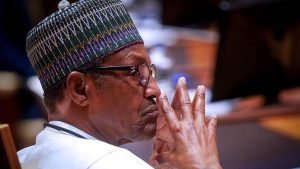
There are those things which, when said, raise questions about what was said. If a man married to his dear wife for fifteen good years asked his wife, ‘do you love me?’, he immediately sets into motion all sorts of thoughts in his wife’s mind. She might wonder why he is asking her this question; or, think of what she might have done or not done lately to deserve this type of question. It could get worse: has he found some nice lady who loves him and tells him how much she loves him? Is he planning a divorce and is looking for reasons? Finally, she answers the question and says she loves him and then comes up with her own questions: ‘why are you asking me this question?’ ‘It is only morning and we’ll leave for work soon; have you a girlfriend at work who loves you and is swooning over you?’ ‘Is that how you would like me to treat you?’ It was a simple question with possibly a simple endearing answer but it has raised serious doubts in the mind of the dear wife who is now confounded.
Is Nigeria’s justice justifiable? You will assume I am simply asking a rhetorical question that needs no answer. This is an example of the axiom that answer is in the question. To make it a real question, then, I shall place justice in quotes: Is ‘justice’ justifiable? The workings of ‘justice’ in Nigeria leave us to wonder what we consider justice to be. That would be defending the indefensible. Sometime in 2014, we were in Madrid for the beatification of Don Alvaro, the second prelate of Opus Dei. We were directed to a street where we could purchase materials on Opus Dei in English. Dr. Nwanne and I walked into this magnificent building that looked like everything but a shop. My friend was not keen on going in because it was clear we were in the wrong place. We walked into a corridor and met a charming lady who made my asking the question easier: ‘Please is this where we can get mementos of St. Josemaria Escriva, Founder of Opus Dei?’ She smiled and answered, ‘Very sorry sir you are in the wrong place. This is the headquarters of the Bar Association. We don’t deal with anything holy here.’
We all burst out into laughter and she patiently directed us to walk far down the same street to the correct address. The judiciary does not deal with saints; it deals with criminals, liars, and all manner of evil-doers, and passes judgements on them. It does more than that. The judiciary comes in as our saviour when we seek redress for the violation of our human rights by whomsoever, especially by the government that is supposed to guarantee our freedom from unjust persecution. The Judiciary is made up of people some of whom, unknown to us, may be criminals, liars, and evil-doers and it is supposed to deliver justice to whomsoever appears before it. We therefore need to be quite clear in our mind that whatever may be the limitations of the individuals in the judiciary they must administer justice.
We could go all the way back to the military regime of Murtala Muhhamed, to the exit of the great luminary Chief Justice of Nigeria, Justice T. O. Elias, and some other justices, to mete charges of illicit behaviour against sitting justices. The former President of Nigeria, Chief Olusegun Obasanjo, in Chapter 6, ‘Social Tuning’, in his book Not My Will, treats the matter thus: ‘One issue of integrity that was raised and the accusation against him was the empaneling of a Supreme Court body to hear the appeal of a land case brought by the Chief Justice’s brother on which the Chief Justice was alleged to have sat, and he chaired that panel which decided in favour of his brother. If it was right legally, we considered it improper and offensive to public morality.’ Mr. Allison Ayida, the Secretary to the Federal Military Government, sought to set the record straight in an article published by The Guardian of 1 April 1990. Mr. Ayida gave different reasons why Justice Elias was removed from office the most important of which was that he had served for too long in government! This would be the first time a sitting Chief Justice of Nigeria was removed from office albeit militarily dictated in a highhanded manner. Was this justice? Was it justifiable?
Is the administration of justice in Nigeria justifiable? This is much like asking a question which raises a number of other compelling questions one of which is who is the judge as to what is justifiable or not? You and I can in conscience readily answer that what is just is justifiable. You then ask what is just? In his Foreword to the Report on Investigations of Human Rights Abuses committed in Nigeria since the last dispensation, the chairman of the Commission, Justice Oputa says: ‘Public perception about the work of the Commission varied enormously. But a common denominator was the concern with justice. In some cases, justice was equated with revenge.’ This is where the Bar plays a vital role in the search for justice. A defendant is charged for having committed an offence, true or false by the State true or false. Each side present its case to the court which will now beyond reasonable doubt determine that justice is served to both the defender, and the State, and thus to society. The court will not go outside the evidence presented in its adjudication. The Bar has a huge role to play here. They are the first evangelists of justice. But I ask is this the case? Is the bar interested in whether justice is justifiable or, rather, in whether justice is as only they see it administered according to their own conceptions or idiosyncrasies of what constitutes justice?
The courts are supposed to be impartial, but are they? According to Justice Njemanze, Chief Judge of Imo State, in his address at the opening of the 2011/2012 Opening Year and Assizes, ‘Some lawyers now have the boldness to malign, denigrate and abuse judges on the pages of newspapers. By so doing such lawyers forget that they are equally maligning themselves because they are also members of that one family called the legal profession to which both lawyers and judges belong… Some lawyers have now resorted to spending client’s money and as a result they betray the fiduciary relationship between them and their clients.’ Thus, we have questions for both the Bar and the Bench.
I am concerned with the rule of law as the bulwark of the social order and in this regard, I am particularly sensitive to the applicability of the rules to those who make and administer the rules. According to Prof. Folarin Shyllon in his Inaugural Lecture at the University of Ibadan, Freedom, Justice and the Due Process of Law, ‘A legal system exemplifies the rule of law to the extent that its rules are sufficiently stable to allow people to be guided by their knowledge of its content of the rules and that those people who have authority to make, administer, and apply the rules in an official capacity are accountable for their compliance with rules applicable to their performance and do actually administer the law consistently and in accordance with its tenor.’
Reda Also: Justice on Sail or for Sale?
The practice of the legal system in Nigeria leaves much to be desired as those entrusted with the authority to act according to law do not comply with law and its rules. The Acting Chief Justice of Nigeria, Mr. Tanko Muhhamad was reported in a July 27, 2019 publication by Premium Times to have said that he would not be surprised if some judges were corrupt since they were part of the Nigerian society. I take serious issue with the Chief Justice. I do not mind his saying he knows some judges were corrupt. But I am disappointed when he says that those corrupt judges simply reflect the corrupt Nigerian society from which they come. Were these same judges not thoroughly screened and found worthy professionally and morally by the Nigerian Judicial Council {NJC) before their elevation to the bench? The Chief Justice chairs the NJC and to a good extent, is the one to be held accountable for any lapses of judges. Institutions are established to help society rise above the prevalence of evil as well as to help raise the standards of probity to the highest possible level. The Chief Justice could say that the corrupt judges in the judiciary only reflected the corrupt Nigerian society. After all, his predecessor in office, Chief Justice Walter Onnoghen, was convicted by the Code of Conduct Tribunal on a 6-count charge involving false declaration of his assets. The tribunal ordered the removal of Justice Onnoghen as NJC Chairman and he was barred for ten years from holding public office. This was the first time a Chief Justice of Nigeria has been put on trial and convicted. What a shame!
May Nigeria’s legal system offer justice. May its judgements be right and justifiable.
Prof. Mark Nwagwu

